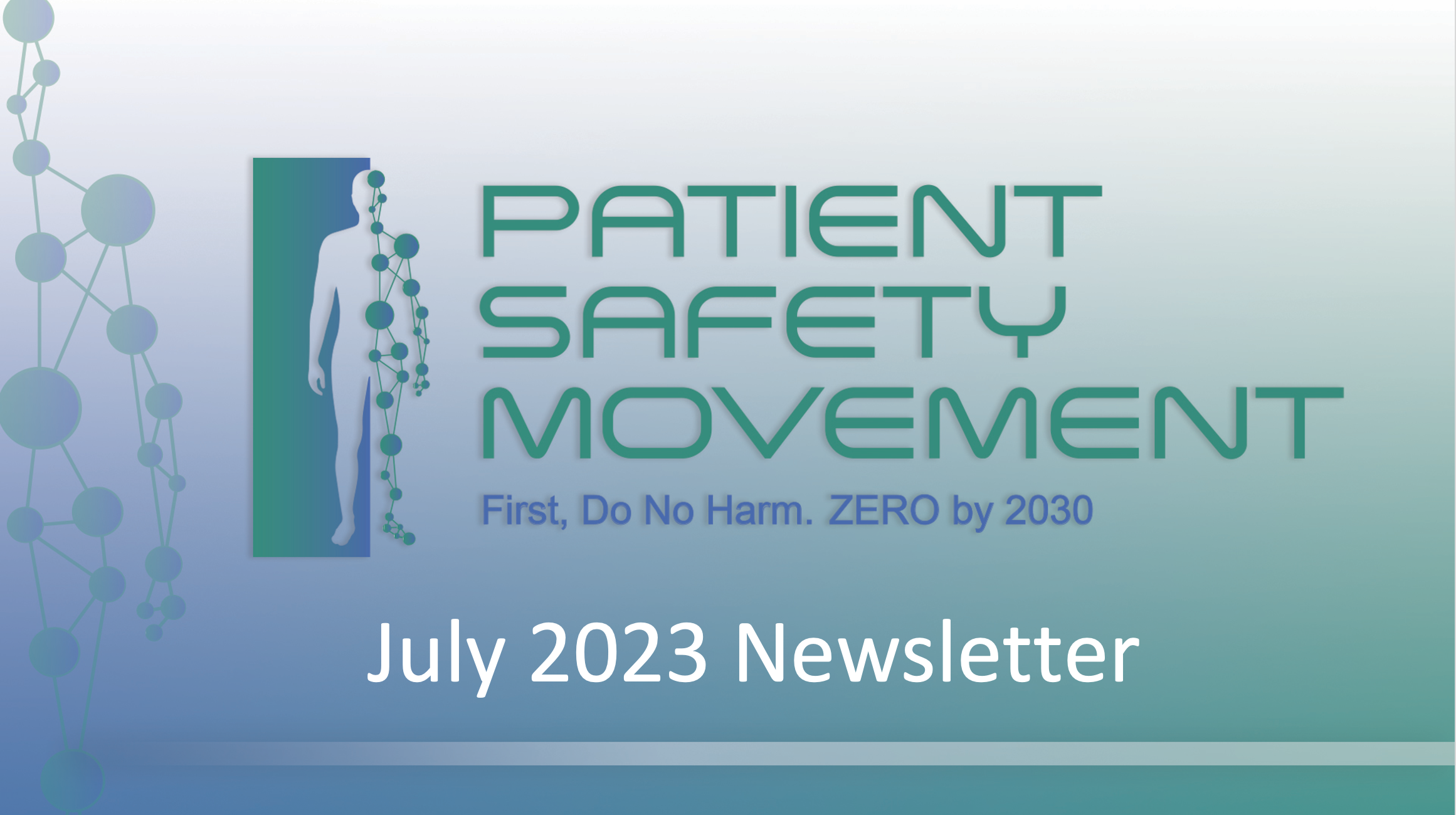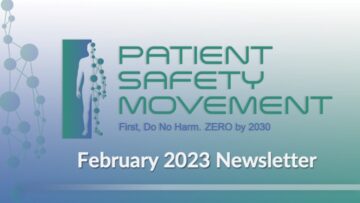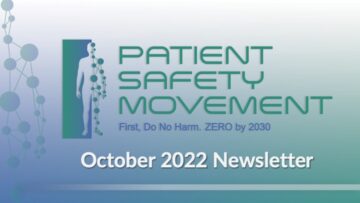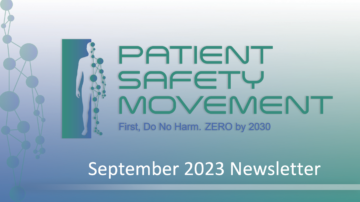Letter from CEO

As we in Texas sweat through a very hot July, I think back and reflect on the Summit meeting and the compelling remarks from our speakers. Don Berwick—one of the original giants in patient safety and a founding member of the Institute for Healthcare Improvement—gave an inspiring keynote address. First, he recognized the superb healthcare force we have
in the US, how dedicated they are, and how frustrated they are by the avoidable harm to patients that is occurring. Next, he recognized the tragic losses that have occurred to loved ones because of preventable errors. Hospital-acquired infections, misdiagnoses, medication errors—these are process errors and have been significantly reduced by some healthcare systems.
He brought it home to us by stating that we are 2 million times safer sitting in an airliner seat than lying in a hospital bed! How did airlines become so safe? It was not by telling the pilots not to crash! It was by putting in safe practices, such as pre-flight checklists and asking the team to speak up if they perceive a problem and report “near misses” without fear of retribution. The system is built to help prevent airline staff from making mistakes, and if they do make one, to prevent harm from occurring.
So the goals of the Patient Safety Movement Foundation must be implemented. Actionable Evidence-Based Practices that have been demonstrated to prevent harm must be instituted everywhere. Standard of practice should not be local or regional; it should be universal and evidence based. Healthcare outcomes data should be transparent. The fastest way to reduce the rate of preventable harm in healthcare will be to have accurate reporting of each hospital’s patient harm rate data. Technology is enabling the determination of this data, using electronic medical record trigger tools, as reported by the Office of the Inspector General last year on Medicare patients and David Bates in a New England Journal of Medicine article on Massachusetts hospitals earlier this year.¹
Aligned incentives should be instituted, in which payment is made for quality of care and not for bad outcomes when evidence-based practices were not used. Finally, an independent national patient safety oversight group should be formed, with strong patient representation, to investigate severe patient harm issues and come up with recommendations.
Professor Francisco Valero-Cuevas mentioned that to implement a new practice takes on average 17 years! WE cannot wait that long. We need this change NOW!
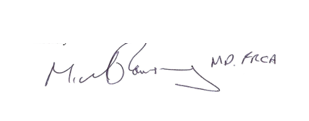
Michael A.E. Ramsay, MD, FRCA, Chief Executive Officer, PSMF
1. US Department of Health and Human Services OIG Report 2022. Adverse events in Hospitals: A Quarter of Medicare Patients Experienced Harm in October 2018. OEI-06-18-00400; Bates DW et al. The Safety of Inpatient Healthcare. N Engl J Med 2023;388:142-153.
PSMF Fellowship Application
The Global Interprofessional Patient Safety Fellowship application is open until August 1. If you are interested in joining our 2024 cohort, please apply at https://psmf.org/fellowship-application/.

World Hepatitis Day – July 28

Every year, more than a million lives are lost to hepatitis around the world in spite of the availability of diagnostic testing and vaccines. The campaign theme for World Hepatitis Day 2023—We’re Not Waiting—is a call to bring the global community together to help accelerate hepatitis elimination efforts. This year’s campaign also highlights the social inequities that underlie the current lack of action on hepatitis elimination while reminding everyone in the healthcare community of the positive action needed to get these efforts on track.
World Hepatitis Day takes place every year on July 28, the birthday of Nobel-prize winning scientist Dr. Baruch Blumberg, who discovered hepatitis B virus (HBV) and developed a diagnostic test and vaccine for the virus. According to WHO, in order to achieve the hepatitis elimination goal by 2030, major gaps in global testing and treatment must be addressed.
Who can’t wait? People unaware they have viral hepatitis and need access to testing. People living with hepatitis but who lack access to life-saving treatments. Expectant mothers who should be screened and then treated as needed. Babies who need a birth dose vaccination. Visit the World Hepatitis Day website for tools and information on how to take action.
Chairman’s Column
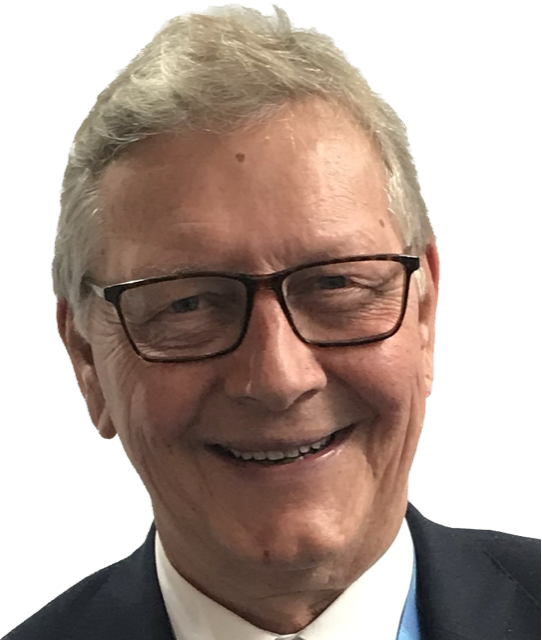
As Europe and the Americas are in the midst of a summer of heat and biblical rainstorms, the UK seems to be stuck in a vortex of systems dominated by an immovable jet stream, providing us with clouds and rain showers. The NHS also appears to be stuck in a cycle of bad weather, with not much sign of a sunnier future. This year is the 75th anniversary of the founding of the NHS (see The NHS then and now: a view from The King’s Fund’s archive), and there are legions of reasons to celebrate such a significant force that has literally changed the lives and futures of generations of the UK population, whereby high-quality care is provided free to all at the point of delivery—the embodiment of a common good.
This system is now in the midst of change and challenge to identify the most appropriate way forward, such that the ideals of 75 years ago can be matched by the fiscal implications of the cost of running a 21st-century health system often described as a complex and adaptive organizational model.
It also has become one of the largest employers in the world, which has brought the attendant issues of human resource management and support as well as the organizational challenges of running hundreds of separate businesses under the umbrella of an Arm’s Length Body, answerable to the government of the day in the way it improves health outcomes and manages the cost of provision, the vast majority of which is provided through taxation at a national level.
Despite our current woes of strikes by our junior doctors (interns and residents), and last week by senior doctors (attendings), as well as nurses and midwives, we must try to understand why this has come to pass and particularly reflect on the impact of the Covid pandemic on our local systems of delivery and on the physical and mental health of healthcare workers of every denomination, as well as the same elements for the populations they are trying to serve.
It is not surprising that there continues to be an inordinate and greater impact on the level of burnout and psychological harm with all our staff in training across the globe. Human and system resources remain scarce, and the high-income countries should not forget we are not safe until we are all safe. While we purport to strive to introduce changes in our workplaces to create a culture of safety, we also know how difficult this is in practice to achieve.
If we are to succeed in managing the human resources of our health systems, then we must continue to invest in our models of support and education of all those who wish to join the most precious of professions to care for the sick. At the same time, we must ensure they are working in an environment of support and psychological safety (see Recommended Resources & Inspiration by Amy C. Edmondson) .
I will never tire of the words of Avedis Donabedian, which are as important now as ever before, while we try to understand how to motivate and care for our staff. Where money may be a motivator for many but not for all, it remains vital to sustain a commitment to our work and our mission. He said: “Systems awareness and systems design are important for health professionals but are not enough. They are enabling mechanisms only. It is the ethical dimension of individuals that is essential to a system’s success. Ultimately, the secret of quality is love. You have to love your patient, you have to love your profession, you have to love your God. If you have love, you can then work backward to monitor and improve the system.”
I cannot finish without mentioning our wonderful three weeks of wedding celebrations in England and Portugal as we brought together our families to support Ellen and Rish to start their new lives together (photo below). A truly global coming together from England, the US, Iran, Ireland, India, and Kenya!

Mike Durkin, OBE, MBBS, FRCA, FRCP, DSC

In the News
- Details of Day 2 of the PSMF’s World Patient Safety, Science & Technology Summit was posted on Yahoo! Finance.
- An NBC News report described the stages of heatstroke and heat exhaustion, medications that can block early warning signs, and what ER doctors are doing to quickly lower body temperature, amid the rising number of ER visits in areas experiencing triple-digit heatwaves.
- An article published by CNN Health updated the state of current efforts to create a National Patient Safety Board.
- With bipartisan support, the Patient Safety Act, a bill that would limit nurse-to-patient ratios in Pennsylvania hospitals, passed the State House and is headed to the State Senate, according to the Pennsylvania Capital-Star.
- U.S. News & World Report announced changes in their hospital rankings methodology to emphasize health equity and outpatient outcomes in response to criticisms, as reported in USA Today.
- The Association of Health Care Journalists discussed the need for increased coverage by the media of medical diagnostic errors, citing various experts who spoke on the issue at a recent conference in the Netherlands.
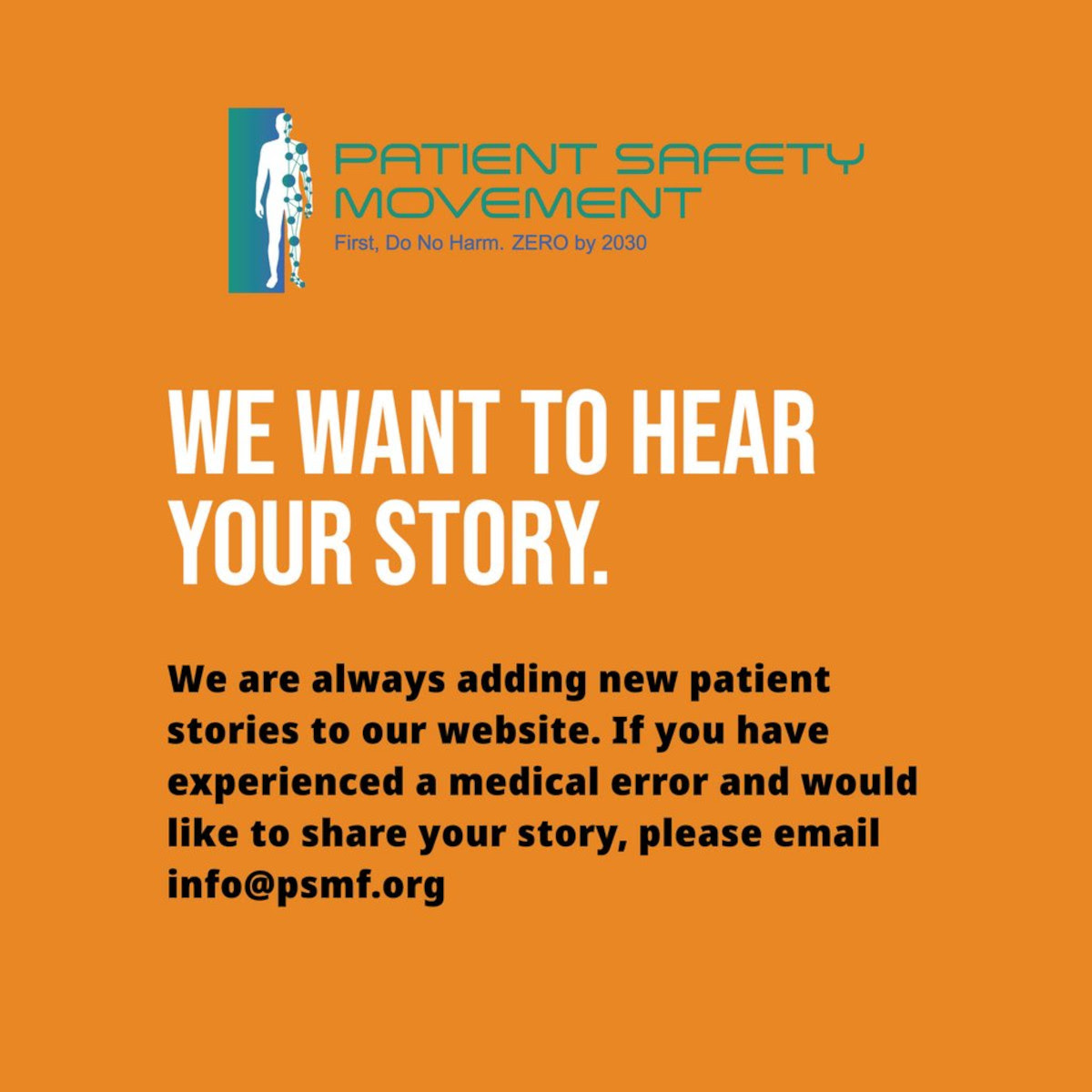
DONOR TESTIMONIALS — WHY I GIVE

I am deeply grateful to the Patient Safety Movement Foundation for being such a strong presence and voice in healthcare. As a clinician myself, who has been committed to advancing safety in healthcare for many years, and with my mother having suffered medical harm seven years ago that left her brain damaged, the purpose-driven effort and values of the Patient Safety Movement Foundation align with my own. This international effort brings individual leaders of like minds together to advance the safety agenda, establish a mechanism to pool critical information to prevent harm, and together, create interventions that target improved quality and safety at the front line.
As Vice President of Risk Management and Safety at BETA Healthcare Group, the largest medical professional liability insurer for hospitals on the West Coast, and a workers’ compensation insurer, I find it incredibly important to care for our workforce who practice at the sharp end of care delivery. It is they who are often interacting with poorly designed systems or processes, which at times, unknowingly, can create conditions that harm patients. Caring for our workforce results in better patient care.
I value the PSMF effort to reinforce the importance of transparent, open, and honest discussions with patients and families when they’ve been harmed and to involve patients in building solutions to make healthcare safer. We must remain present and committed to healing those we’ve harmed (emotionally, physically, and financially) and practice extreme curiosity so we can learn of defects, then deploy interventions to prevent recurrence. Some of those solutions already exist in the PSMF’s Actionable Evidence-Based Practices.
I enjoy being a member of the Patient Safety Movement Foundation, as it enables leaders to draw on the expertise of many. To create a model of continuous learning and build reliable processes in healthcare requires active participation and involvement in a “learning exchange.” I view the PSMF as a learning exchange which is not bound by border or country. The value of PSMF is that it promotes creativity, innovation, and iterative tests of change to advance and enhance care globally as we, collectively, pursue a shared mission.
My view through the lens of a family member affected by medical error, a nurse who practiced at the front line and made errors that I will forever reflect on, and while now serving in a role committed to advancing safety at over 600 hospitals and healthcare entities, I find there is no better time than the present to act.
Heather Gocke, M.S., RN, CPHRM, C-EFM
Vice President of Risk Management and Safety
BETA Healthcare Group
GOVERNANCE BOARD
Mike Durkin, OBE, MBBS, FRCA, FRCP, DSC, Chairman of PSMF, Senior advisor on Patient Safety Policy and Leadership, Institute of Global Health Innovation, Imperial College London
Steven J. Barker, PhD, MD, Chief Science Officer, Masimo Corporation, Professor Emeritus of Anesthesiology, University of Arizona Health Sciences
Robin Betts, RN, CPHQ, MBA-HA, Vice Chair, PSMF, Vice President, Safety Quality & Regulatory Services, Kaiser Foundation Hospitals and Health Plan, Kaiser Permanente Northern California
Alicia Cole, Patient Safety Consultant
Javier T. Davila, MD, MFS, Ambassador, PSMF in Mexico, Former Medical Director, Mexican Social Security Institute, Head of Medical Education, Research and Health Public Policy
Omar Ishrak, PhD, Executive Chairman and Chairman of the Board of Directors, Medtronic, Chairman of the Board of Directors, Intel
Philip D. Lumb, MB, BS, MD, MCCM, FCCP, Professor of Anesthesiology and Trauma Surgery, Keck School of Medicine at University of Southern California
Joe Kiani, Founder and Immediate Past Chairman of PSMF, Founder, Chairman & CEO of Masimo
Sarah Kiani, Director, Masimo Foundation for Ethics, Innovation, and Competition
David B. Mayer, MD, Executive Director, MedStar Institute for Quality and Safety
Jannicke Mellin-Olsen, MD, DPH, Past President, World Federation of Societies of Anesthesiologists
Jim Messina, CEO, The Messina Group
Najmedin Meshkati, Ph.D, MS, Professor of Civil/Environmental Engineering, University of Southern California
Charlie Miceli, CPM, Treasurer, PSMF, Chief Supply Chain Officer, Network VP of University of Vermont Health Network
Michael A.E. Ramsay, MD, FRCA, Chief Executive Officer, PSMF
Abbasseh Towfigh, MPD, Executive Director and Secretary, Ayeneh Foundation
Vonda Vaden Bates, Patient Advocate, CEO, 10th Dot
OUR STORY
 In 2012, Joe Kiani founded the nonprofit Patient Safety Movement Foundation (PSMF) to eliminate preventable medical errors in hospitals. His team worked with patient safety experts from around the world to create Actionable Evidence-Based Practices (AEBP) that address the top challenges. The AEBP is available without charge to hospitals online.
In 2012, Joe Kiani founded the nonprofit Patient Safety Movement Foundation (PSMF) to eliminate preventable medical errors in hospitals. His team worked with patient safety experts from around the world to create Actionable Evidence-Based Practices (AEBP) that address the top challenges. The AEBP is available without charge to hospitals online.
Hospitals are encouraged to make a formal commitment to ZERO preventable deaths, and healthcare technology companies are asked to sign the Open Data Pledge to share their data so that predictive algorithms that can identify errors before they become fatal can be developed. The Foundation’s annual World Patient Safety, Science & Technology Summit brings together all stakeholders, including patients, healthcare providers, medical technology companies, government employers, and private payers. The PSMF was established through the support of the Masimo Foundation for Ethics, Innovation, and Competition in Healthcare. For more information, please visit psmf.org.

